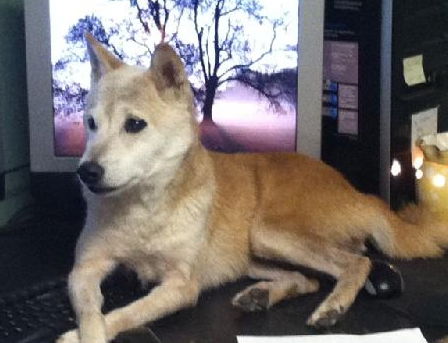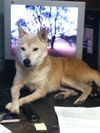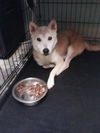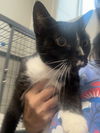Welcome to Pet Rescue By Judy!
401 South Laurel Avenue
Sanford, FL 32771
(407) 302-4497
info@petrescuebyjudy.com
Ginger the Senior Shiba Inu's Web Page

| My Rescue |
| Login to Remember your Favorite Animals and Breeds! |
Name: Ginger the Senior Shiba Inu
Status: Adopted!
Adoption Fee: 100.00
Species: Dog
Breed: Shiba Inu (short coat)
Learn more about the Shiba Inu.Color: tan and white
Sex: Female (spayed)
Current Size: 21 Pounds
General Potential Size: Small
Current Age: 24 Years 9 Months (best estimate)
Activity Level: Slightly Active
Indoor or Outdoor: Indoor Only
Housetrained: Yes
Microchipped: Yes
Description:
Poor Ginger! She was adopted as a puppy by a nice woman, and lived with her for all 12 years of her life. But her human got really sick and can no longer care for her. She is moving back to the Midwest with her parents, who are elderly and would be unable to care for both their daughter and the dog. Right now, we think Ginger is really confused about why she's with us. She has obviously been loved and well cared for. Ginger has never been around children, so we're not sure how she would do. I would say any children younger than she is would not be wise. If you are looking for a quiet, sweet senior dog, then please consider taking Ginger into your home!
Staff Update, 8/19/13: Ginger has been with us for almost 3 weeks. Today, she finally let me pet her. She's seen me nearly every day and while she has stood close to me, walked on the leash with me, and laid at my feet, she still didn't completely trust me. I am mentioning this because if you take her into your home, there might be a very long adjustment period. She will want to be with you, but don't be shocked if it's a few days (or a week, or 2) before she will let you pet her.
According to www.dogbreedinfo.com, the Shiba Inu is an ancient Asian breed, probably with Chow Chow and Kyushu blood. It was brought to Japan from China two thousand years ago. Six distinct breeds developed from these original dogs, including the Akita and the Shiba Inu. The Shiba is the smallest of the six Japanese Spitz-type dogs. Some of the other six breeds are now extinct. Shibas were originally bred to flush birds and hunt small game. The breed may have been named for the brushwood environment where the dog hunted, because the bright red color of the autumn brushwood leaves matches the color of some Shiba's coats, or perhaps just for size, as the word "shiba" means both "brushwood" and "small." The word "Inu" means "dog." World War II was a difficult time for many dog breeds worldwide, and the Shiba was not an exception. Though the breed almost become extinct, breeding programs were established after the war, using individuals from the countryside. The Shiba is now the most popular breed in Japan and in recent years has been gaining popularity in the United States as well, primarily as a companion dog. Some of the Shiba's talents include: hunting, tracking, watchdogging, guarding, agility and performing tricks. The Shiba is an alert, lively and bold dog. Independent, but affectionate and loving. Kind, trainable, brave and clean. Confident, fearless and courageous. A big dog in a small dog's body. The Shiba is agile, fast and playful. Charming and open. They bark little and bond closely with their handler while remaining independent. It may be a bit reserved with strangers but children do not usually cause any problems, for Shiba's make good companions for children. Socialize this breed well as a puppy. They do well with other dogs and cats if they are raised with them from puppyhood, though they tend to be aggressive with members of the same sex. Don't trust this dog around other small pets such as rodents and small birds. Big birds such as parrots may be okay. The Shiba is an easy dog to travel with. Be careful during hunting season as the dog looks like a fox and may be mistaken for one. It is not usually a reliable off-leash dog. It is easy to housebreak these dogs because they are naturally fastidious.
Poor Ginger! She was adopted as a puppy by a nice woman, and lived with her for all 12 years of her life. But her human got really sick and can no longer care for her. She is moving back to the Midwest with her parents, who are elderly and would be unable to care for both their daughter and the dog. Right now, we think Ginger is really confused about why she's with us. She has obviously been loved and well cared for. Ginger has never been around children, so we're not sure how she would do. I would say any children younger than she is would not be wise. If you are looking for a quiet, sweet senior dog, then please consider taking Ginger into your home!
Staff Update, 8/19/13: Ginger has been with us for almost 3 weeks. Today, she finally let me pet her. She's seen me nearly every day and while she has stood close to me, walked on the leash with me, and laid at my feet, she still didn't completely trust me. I am mentioning this because if you take her into your home, there might be a very long adjustment period. She will want to be with you, but don't be shocked if it's a few days (or a week, or 2) before she will let you pet her.
According to www.dogbreedinfo.com, the Shiba Inu is an ancient Asian breed, probably with Chow Chow and Kyushu blood. It was brought to Japan from China two thousand years ago. Six distinct breeds developed from these original dogs, including the Akita and the Shiba Inu. The Shiba is the smallest of the six Japanese Spitz-type dogs. Some of the other six breeds are now extinct. Shibas were originally bred to flush birds and hunt small game. The breed may have been named for the brushwood environment where the dog hunted, because the bright red color of the autumn brushwood leaves matches the color of some Shiba's coats, or perhaps just for size, as the word "shiba" means both "brushwood" and "small." The word "Inu" means "dog." World War II was a difficult time for many dog breeds worldwide, and the Shiba was not an exception. Though the breed almost become extinct, breeding programs were established after the war, using individuals from the countryside. The Shiba is now the most popular breed in Japan and in recent years has been gaining popularity in the United States as well, primarily as a companion dog. Some of the Shiba's talents include: hunting, tracking, watchdogging, guarding, agility and performing tricks. The Shiba is an alert, lively and bold dog. Independent, but affectionate and loving. Kind, trainable, brave and clean. Confident, fearless and courageous. A big dog in a small dog's body. The Shiba is agile, fast and playful. Charming and open. They bark little and bond closely with their handler while remaining independent. It may be a bit reserved with strangers but children do not usually cause any problems, for Shiba's make good companions for children. Socialize this breed well as a puppy. They do well with other dogs and cats if they are raised with them from puppyhood, though they tend to be aggressive with members of the same sex. Don't trust this dog around other small pets such as rodents and small birds. Big birds such as parrots may be okay. The Shiba is an easy dog to travel with. Be careful during hunting season as the dog looks like a fox and may be mistaken for one. It is not usually a reliable off-leash dog. It is easy to housebreak these dogs because they are naturally fastidious.
Other Pictures of Ginger the Senior Shiba Inu (click to see larger version):
 92.4k |
 35.1k |
Copyright © Pet Rescue by Judy





